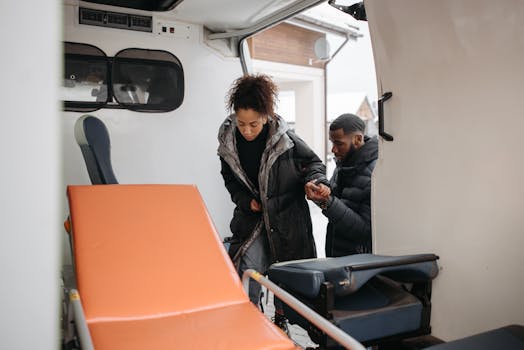You could take a college course, which may help you when looking for work.
Courses include:
- care
- health and social care
- T Level in Health
Entry requirements
Entry requirements for these courses vary.
Ambulance Care Assistants, also known as Patient Transport Service (PTS) drivers or non-emergency ambulance drivers, play a vital role in the healthcare system. They are responsible for transporting patients who are not in an emergency situation but need help getting to and from hospitals, clinics, or day centres. This can include elderly patients, people with disabilities, or those receiving regular treatments such as dialysis or chemotherapy. The role involves supporting patients before, during, and after their journey, ensuring their comfort and safety, and sometimes assisting with mobility or using specialist equipment. Good communication and a caring attitude are essential, as is the ability to work well under pressure and as part of a team.

Ambulance Care Assistants in the UK typically earn between £18,500 and £21,000 per year, depending on experience and employer.
There are around 8,000 to 10,000 Ambulance Care Assistant roles across the UK, with most positions within NHS trusts.
Ambulance Care Assistants usually work 37.5 hours per week, often including shifts, weekends, and sometimes night work.

Responsible for driving patients who are not in an emergency situation to and from hospitals, clinics, and care homes, ensuring their safety and comfort during the journey.

Supports patients with mobility issues during their transport to medical appointments, helping them get in and out of vehicles and providing reassurance throughout their journey.
Specialises in transporting and assisting patients who require regular kidney dialysis treatment, ensuring their specific needs are met while travelling to and from medical facilities.
Research what an Ambulance Care Assistant does day-to-day, including main duties and working conditions.
Look at NHS websites, job descriptions, and career profiles to learn about the tasks involved, such as assisting patients into vehicles, monitoring their wellbeing during journeys, and working as part of a team. Consider the need for compassion, patience, and good communication skills.
Talk to current Ambulance Care Assistants or attend career talks to gain real insights.
You might be able to arrange a chat with someone in the role through a local NHS trust or during a careers event at school or college. This will help you understand the challenges and rewards of the job, and ask questions about their experiences.
Aim for GCSEs, particularly in English and Maths, and check requirements for local NHS Ambulance Services.
Most employers require at least GCSEs at grades 9-4 (A-C) in English and Maths. Some may also look for a driving licence, especially with a clean record. Check job adverts carefully to ensure you meet all requirements.
Obtain experience in caring or customer service roles, either paid or voluntary.
Experience in healthcare, social care, or supporting vulnerable people is valuable. Volunteering with patient transport services, care homes, or disability charities can help you develop the right skills and demonstrate your commitment.
Search for and apply to Ambulance Care Assistant jobs through the NHS Jobs website or local ambulance service websites.
Prepare a strong application highlighting your qualifications, skills, and any relevant experience. Tailor your CV and covering letter to show your suitability for the role. You may be invited to an interview or assessment day.
Take part in employer-provided training, including first aid, patient handling, and health and safety.
Training will often be provided once you are hired. This can include classroom learning, practical sessions, and shadowing experienced staff. You’ll learn about patient care, manual handling, and how to use specialised equipment safely.
Explore relevant apprenticeships that can help you kickstart your career in Ambulance Care Assistant. Apprenticeships offer hands-on experience and training while earning a wage.
An Ambulance Care Assistant and a Care Worker both provide support and assistance to individuals with health or personal needs, often in community or care home settings. They require similar skills in communicating with vulnerable clients, assisting with daily activities, and maintaining their wellbeing.
You can get into this job through:
You could take a college course, which may help you when looking for work.
Courses include:
Entry requirements for these courses vary.
You could apply to do an apprenticeship with a care organisation or the NHS.
Apprenticeship options include:
These can take between 1 and 2 years to complete and combine workplace training with study in the classroom.
There are no set entry requirements but it may help you to get in if you have:
You can volunteer with an organisation that supports vulnerable people, like a care home, charity, hospital or hospice. This can help you when applying for paid work.
You can find volunteering opportunities through:
You can apply for care worker jobs directly. If you get the role, you'll be given on-the-job training by your employer.
It's important to be kind, caring and have a respectful attitude towards people who need care and support.
Some employers might want you to have GCSEs in English and maths at grades 9 to 4 (A* to C), or equivalent. However, many will offer training to applicants who have the right personal qualities.
Time spent caring for someone you know also counts as having experience in a caring role.
You can find out more about careers in care from:
Explore other careers or use our AI to discover personalised paths based on your interests.
Address
Developing Experts Limited
Exchange Street Buildings
35-37 Exchange Street
Norwich
NR2 1DP
UK
Phone
01603 273515
Email
[email protected]
Copyright 2026 Developing Experts, All rights reserved.
Unlock expert-designed lessons, resources, and assessments tailored for educators. No credit card required.
Claim Your Free Trial →